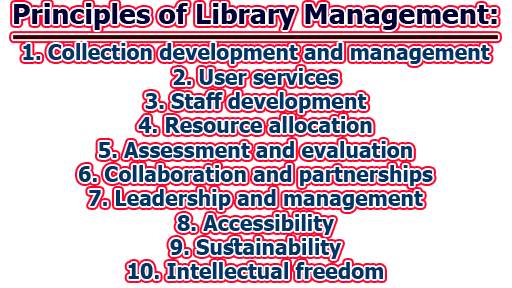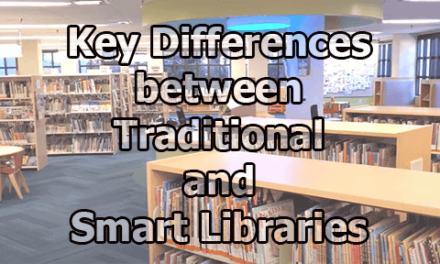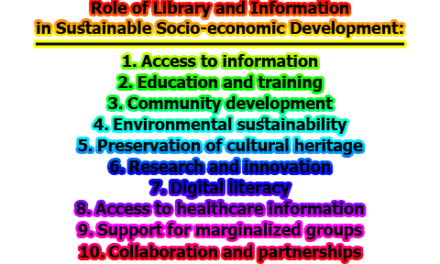Principles of Library Management:
Library management is the process of organizing, controlling, and coordinating library resources, staff, and services to meet the needs of library users. Effective library management requires an understanding of the principles that govern library operations and services. In this article, we will discuss the principles of library management and provide examples of how these principles can be applied in a library setting.
1. Collection development and management: The principle of collection development and management involves selecting, acquiring, organizing, and maintaining library materials in order to meet the needs of library users. This principle emphasizes the importance of developing a collection that is comprehensive, diverse, and responsive to the needs of the community.
Example: A public library located in a diverse community should develop a collection that reflects the cultural and linguistic diversity of its patrons. This might involve acquiring materials in languages other than English, as well as materials that represent the various cultural groups within the community.
2. User services: The principle of user services involves providing a range of services and resources that meet the needs of library users. This principle emphasizes the importance of providing access to information, assistance with research, and support for lifelong learning.
Example: A university library might offer workshops and tutorials on how to conduct research, as well as one-on-one research consultations with librarians. The library might also offer access to specialized databases and other resources that are not available to the general public.
3. Staff development: The principle of staff development involves providing training and support to library staff so that they can provide high-quality services to library users. This principle emphasizes the importance of ongoing learning and professional development.
Example: A library might offer training on new technologies, such as digital library systems or social media platforms. The library might also provide opportunities for staff to attend conferences and workshops in order to stay up-to-date with developments in the field.
4. Resource allocation: The principle of resource allocation involves allocating resources such as budget, staff, and space in order to meet the needs of library users. This principle emphasizes the importance of making strategic decisions about how resources are allocated in order to maximize their impact.
Example: A library might allocate a larger portion of its budget to digital resources in order to meet the needs of patrons who prefer to access materials online. The library might also allocate additional staff resources to the development of digital services in order to enhance the library’s online presence.
5. Assessment and evaluation: The principle of assessment and evaluation involves measuring and evaluating the effectiveness of library services and operations in order to identify areas for improvement. This principle emphasizes the importance of data-driven decision-making and ongoing assessment.
Example: A library might conduct surveys of its patrons in order to determine their satisfaction with library services and resources. The library might also use usage data to identify trends in patron behavior and make decisions about resource allocation and service development.
6. Collaboration and partnerships: The principle of collaboration and partnerships involves working with other organizations and individuals in order to enhance the services and resources offered by the library. This principle emphasizes the importance of building relationships and leveraging partnerships in order to achieve common goals.
Example: A library might partner with local schools in order to provide outreach services to students and teachers. The library might also collaborate with local community organizations in order to offer programming and resources that meet the needs of specific populations within the community.
7. Leadership and management: The principle of leadership and management involves providing effective leadership and management in order to achieve the library’s goals and objectives. This principle emphasizes the importance of strong leadership and effective management practices.
Example: A library might hire a director who has experience managing complex organizations and who has a vision for the library’s future. The library might also establish clear policies and procedures in order to ensure that staff are aware of their roles and responsibilities.
8. Accessibility: The principle of accessibility involves ensuring that library services and resources are accessible to all members of the community, regardless of their physical, cognitive, or linguistic abilities. This principle emphasizes the importance of providing accommodations and assistive technologies that enable users to access library materials and services.
Example: A library might provide audiobooks, large print materials, and assistive technologies such as screen readers and magnifiers to ensure that users with visual impairments can access library resources. The library might also provide sign language interpretation and other accommodations to ensure that users with hearing impairments can participate in library programming.
9. Sustainability: The principle of sustainability involves managing library resources in an environmentally responsible manner. This principle emphasizes the importance of reducing waste, conserving energy, and using sustainable materials and technologies whenever possible.
Example: A library might install energy-efficient lighting, heating, and cooling systems in order to reduce energy consumption. The library might also use recycled materials in its construction and renovation projects, and implement recycling and composting programs to reduce waste.
10. Intellectual freedom: The principle of intellectual freedom involves protecting the rights of library users to access information and ideas, without censorship or interference. This principle emphasizes the importance of promoting free and open access to information and resisting attempts to restrict or control the content of library materials.
Example: A library might develop policies and procedures to ensure that all library materials are selected and maintained based on their educational or informational value, rather than on political or ideological considerations. The library might also provide resources and programming that promote critical thinking and intellectual inquiry, in order to foster an environment of open and respectful discourse.
Finally, we can say that the principles of library management are essential for ensuring that libraries are able to provide high-quality services and resources to their users. By following the above principles, libraries can adapt to changing user needs and remain relevant in an increasingly digital world.
References:
- American Library Association. (2015). Core competencies of librarianship.
- Association of College and Research Libraries. (2018). Framework for information literacy for higher education.
- Gorman, M. (2018). Our enduring values revisited: Librarianship in an ever-changing world. American Library Association.
- Library of Congress. (2021). Mission & priorities.
- Matarazzo, J. M., & Pearlstein, T. B. (2013). The practical library manager. McFarland.
- Public Libraries 2030. (2019). Manifesto for public libraries.

Library Lecturer at Nurul Amin Degree College










